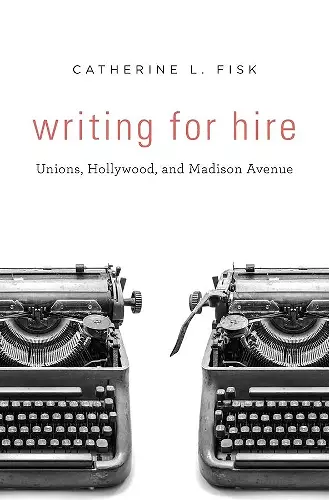Writing for Hire
Unions, Hollywood, and Madison Avenue
Format:Hardback
Publisher:Harvard University Press
Published:27th Oct '16
Currently unavailable, and unfortunately no date known when it will be back

Required to sign away their legal rights as authors as a condition of employment, professional writers may earn a tidy living for their work, but they seldom own their writing. Writing for Hire traces the history of labor relations that defined authorship in film, TV, and advertising in the mid-twentieth century. Catherine L. Fisk examines why strikingly different norms of attribution emerged in these overlapping industries, and she shows how unionizing enabled Hollywood writers to win many authorial rights, while Madison Avenue writers achieved no equivalent recognition.
In the 1930s, the practice of employing teams of writers to create copyrighted works became widespread in film studios, radio networks, and ad agencies. Sometimes Hollywood and Madison Avenue employed the same people. Yet the two industries diverged in a crucial way in the 1930s, when screenwriters formed the Writers Guild to represent them in collective negotiations with media companies. Writers Guild members believed they shared the same status as literary authors and fought to have their names attached to their work. They gained binding legal norms relating to ownership and public recognition—norms that eventually carried over into the professional culture of TV production.
In advertising, by contrast, no formal norms of public attribution developed. Although some ad writers chafed at their anonymity, their nonunion workplace provided no institutional framework to channel their demands for change. Instead, many rationalized their invisibility as creative workers by embracing a self-conception as well-compensated professionals devoted to the interests of clients.
This is an incisive work of scholarship and historical reconstruction that not only captures the dilemma of authorship in corporatized film, TV, and advertising but also demonstrates the central importance of good old-fashioned trade unionism in defending the creativity, status, and income of even the most renowned writers. For any ‘knowledge worker’ vexed about his or her place in the gig economy, Catherine Fisk’s eye-opening book is essential reading. -- Nelson Lichtenstein, author of A Contest of Ideas: Capital, Politics, and Labor
Drawing on previously unexplored archival sources, Catherine Fisk has produced a rich and rewarding comparison of two parallel cultures of professional writers doing similar work in different industries. Fisk’s book combines a captivating narrative with insightful legal, economic, and social analysis of how writers, movie studios, and advertising agencies grappled with issues of attribution in the formative decades of radio, film, and television. -- R. Anthony Reese, University of California, Irvine School of Law
Opening the archives of firms, guilds, and corporations, Catherine Fisk uncovers the stories of dozens of writer-employees and the rapidly changing parameters of their work. Madison Avenue and Hollywood appear as we’ve never seen them before—as twin sectors of the work-for-hire economy separated at birth by divergent practices of attribution, recognition, and unionization. Writing for Hire makes labor history an indispensable means of understanding copyright in the twentieth century and beyond. -- Paul K. Saint-Amour, author of Tense Future: Modernism, Total War, Encyclopedic Form
Catherine Fisk has written an immensely readable historical study of the legal and social significance of creative authorship in the American entertainment and advertising industries. Writing for Hire provides clarity and insight on questions of authorship, intellectual property, and unionization—all of which are essential concerns for anyone working in or studying the creative industries today. -- Miranda Banks, author of The Writers: A History of American Screenwriters and Their Guild
An illuminating work for everyone interested in histories of ‘the author,’ of intellectual property, of unionization, and of Hollywood. Fisk tells a largely unknown story of labor success. And along the way, she uses her imaginative and extensive research to offer something close to an ethnography of contracting behavior and the cultural underpinnings of contracting in twentieth-century America.
-- Hendrik Hartog, Princeton University- Nominated for John Phillip Reid Book Award 2017
- Nominated for James Willard Hurst Prize 2017
- Nominated for Herbert Jacob Book Prize 2017
- Nominated for Scribes Book Award 2017
ISBN: 9780674971400
Dimensions: unknown
Weight: unknown
320 pages